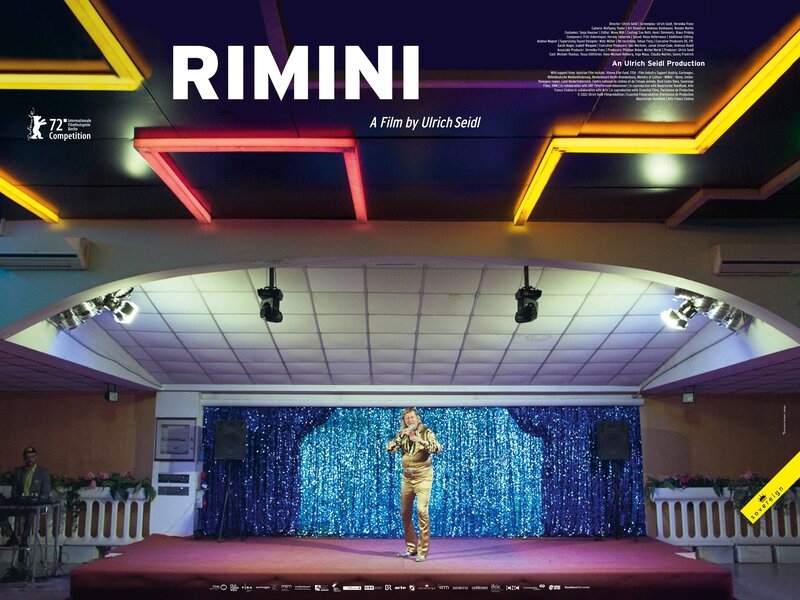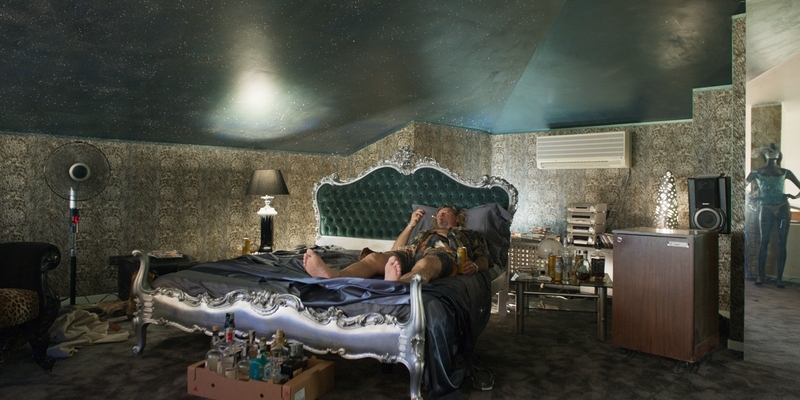
Review by
Eric Hillis
Directed by: Ulrich Seidl
Starring: Michael Thomas, Tessa Göttlicher, Hans-Michael Rehberg, Inge Maux, Claudia Martini, Georg Friedrich

Much like his compatriot Michael Haneke, Austrian filmmaker
Ulrich Seidl isn't exactly known for his chirpiness. His films
generally present a cynical worldview, with Seidl treating his
protagonists with contempt at best, cruelty at worst. His latest,
Rimini, features a contemptuous protagonist, but while the movie revels in
their downfall it also manages to generate a lot of laughs.

The film's title suggests sunshine and crowded beaches, but of course
this is an Ulrich Seidl film and so we find the Italian resort town in
the bleakness of off-season winter. Tourists are few and far between,
African migrants sleep in doorways and on the empty beaches, and a
constant fog shrouds the town. Seidl uses off-season Rimini here in the
same manner as Harry Kumel exploited the bleakness of wintry Ostend in
his vampire classic Daughters of Darkness.
Rimini's anti-hero, Richie Bravo (Michael Thomas), a tacky
fifty-something crooner in the Germanic schlager tradition, is something
of a vampire himself, sleeping all day and emerging as darkness falls to
ply his trade. This involves singing for coach-loads of elderly Austrian
and German tourists, most of whom are adoring fans familiar with Richie
from earlier days of more starry success. The meagre fees the empty
hotels pay him for his services aren't enough to fuel his drinking
habits so Richie doubles as a gigolo, giving his aging female fans the
full Richie Bravo experience, presented in Seidl's typically unflinching
style.

It's probably not the life Richie would have envisioned for himself,
but he's settled into a comfortable rhythm. His contentedness is
disrupted by the arrival of his twenty-something daughter Tessa (Tessa Gottlicher), whom he walked out on as a child. Accompanied by a van-load of young
Arab men, Tessa sets about extorting money from her estranged father,
which she views as a form of reparations for his absence all these
years. Struck by either guilt or genuine affection, or both, Richie sets
about gathering the sum of €30,000 they've agreed upon as suitable
recompense. This involves attempting to access his senile father's bank
account and blackmailing his male fans with footage of him shagging
their wives.
Thomas's Richie recalls two earlier movie characters. With his line in
crooning and his considerable paunch, Richie bears similarities to the
figure played by Gerard Depardieu in Xavier Giannoli's
When I Was a Singer, but more so he may remind you of the protagonist of Darren
Aronofsky's The Wrestler. Along with Thomas's resemblance to latter day Mickey Rourke, Richie
finds himself in a similar position to the aging grappler of Aronofsky's
film. The glimpses of Richie preparing himself backstage for his shows
might be confused with those of a fighter about to enter the ring, as he
checks his mullet and tries to wrap his stomach in constraining girdles.
Like Aronofsky, Seidl focuses heavily on the deteriorating physical
condition of his anti-hero. Richie's spangly performances stand in stark
contrast to the explicit footage we're presented of him "pleasuring" his
female fans, his stomach spilling out across their prone backs, when he
can rise to the occasion (it's heavily suggested both of Richie's
"talents" are in the wane). And of course, both films feature an
estranged daughter, but where there was a sweetness to this dynamic in
The Wrestler, here it's more a case of two people exploiting one another. This is
an Ulrich Seidl movie after all.

And knowing who is behind Rimini makes its comedy all the
more surprising. There's a lot of grimness in Rimini, but it's mostly a case of punching up, as Seidl mocks middle-class
Europeans and their milquetoast taste in entertainment. There are
several digs at the thinly concealed prejudice that permeates in a part
of the world that prides itself on its liberalism, with one hilarious
sequence that sees Richie forced to croon at the top of his lungs to
drown out an old Nazi song his father starts belting out during a
nursing home visit. Tragedy and comedy are interwoven in moments like a
"client" of Richie interrupting their rutting session to tend to her
invalid mother in the next room. Seidl claims he was inspired to make
the movie when Thomas began singing a Sinatra song at a wrap party for
an earlier film. You'll be glad he did, as Thomas has found what will
likely prove his signature character, and Richie, along with his awful
yet strangely catchy tunes, is a figure that will linger in the viewer's
mind for longer than you'd probably like. Amore
Miiiiiiiioooooooooo……….

